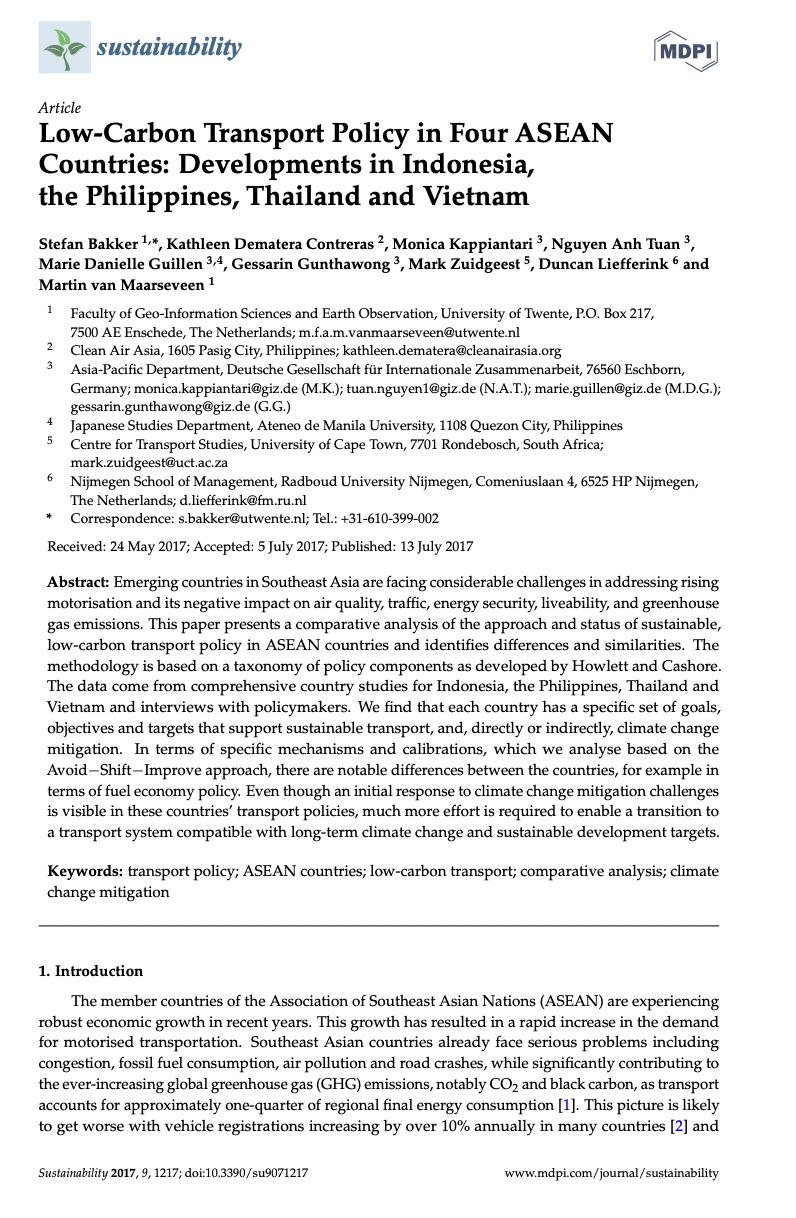
Keyword(s)
Author(s)
(a) Stefan Bakker; (b) Kathleen Dematera Contreras; (c) Monica Kappiantari; (c) Nguyen Anh Tuan; (c,d) Marie Danielle Guillen; (c) Gessarin Gunthawong; (e) Mark Zuidgeest; (f) Duncan Liefferink; (a) Martin van Maarseveen
Country(ies)
Publisher
Published Date
Access
DOI
(a) Faculty of Geo-Information Sciences and Earth Observation, University of Twente, P.O. Box 217, 7500 AE Enschede, The Netherlands;
(b) Clean Air Asia, 1605 Pasig City, Philippines;
(c) Asia-Pacific Department, Deutsche Gesellschaft für Internationale Zusammenarbeit, 76560 Eschborn, Germany;
(d) Japanese Studies Department, Ateneo de Manila University, 1108 Quezon City, Philippines;
(e) Centre for Transport Studies, University of Cape Town, 7701 Rondebosch, South Africa;
(f) Nijmegen School of Management, Radboud University Nijmegen, Comeniuslaan 4, 6525 HP Nijmegen, The Netherlands;
Emerging countries in Southeast Asia are facing considerable challenges in addressing rising motorisation and its negative impact on air quality, traffic, energy security, liveability, and greenhouse gas emissions. This paper presents a comparative analysis of the approach and status of sustainable, low-carbon transport policy in ASEAN countries and identifies differences and similarities. The methodology is based on a taxonomy of policy components as developed by Howlett and Cashore. The data come from comprehensive country studies for Indonesia, the Philippines, Thailand and Vietnam and interviews with policymakers. We find that each country has a specific set of goals, objectives and targets that support sustainable transport, and, directly or indirectly, climate change mitigation. In terms of specific mechanisms and calibrations, which we analyse based on the Avoid−Shift−Improve approach, there are notable differences between the countries, for example in terms of fuel economy policy. Even though an initial response to climate change mitigation challenges is visible in these countries’ transport policies, much more effort is required to enable a transition to a transport system compatible with long-term climate change and sustainable development targets.
Cite:
Bakker, S.; Dematera Contreras, K.; Kappiantari, M.; Tuan, N.A.; Guillen, M.D.; Gunthawong, G.; Zuidgeest, M.; Liefferink, D.; Van Maarseveen, M. Low-Carbon Transport Policy in Four ASEAN Countries: Developments in Indonesia, the Philippines, Thailand and Vietnam. Sustainability 2017, 9, 1217. https://doi.org/10.3390/su9071217